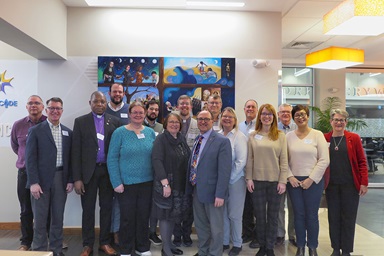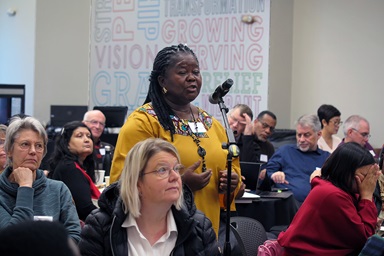United Methodists have officially joined a boycott of Taco Bell restaurants.
First called in March 2001 by the Florida-based Coalition of Immokalee Workers, the consumer boycott is in protest of Taco Bell’s refusal to address the issue of alleged worker exploitation by its tomato suppliers. Other religious endorsers include the Presbyterian Church (USA), the Christian Church (Disciples of Christ), the United Church of Christ, the American Friends Service Committee and the National Council of Churches.
The boycott petition, submitted by Methodists Associated Representing the Cause of Hispanic Americans (MARCHA), was passed May 1 without debate by the United Methodist General Conference along with other items on a consent calendar.
The petition said that Immokalee farm workers “earn sub-poverty wages for picking tomatoes used in Taco Bell food products. According to the Department of Labor, their average wage (40 cents per 32 pound bucket) has not changed in more than 20 years.” Six L’s Packing Co., one of the largest U.S. tomato growers, has been cited by the coalition in particular for exploiting its workers.
Because farm workers are not covered by the National Labor Relations Act, they also are routinely denied unemployment and workers’ compensation benefits.
United Methodists will remain a part of the boycott until Taco Bell “convenes serious three-way talks between the Coalition of Immokalee Workers, representatives of Taco Bell and their tomato supplies to address exploitation and slavery in the fields.”
Taco Bell also must help raise worker wages by increasing the per-pound rate it pays for tomatoes and work with coalition and tomato industry and suppliers “to establish a code of conduct that would ensure workers’ fundamental labor rights by defining strict wage and working condition standards required of all Taco Bell suppliers.”
The denomination’s Council of Bishops is called to consult with the United Methodist Board of Church and Society to name a monitoring committee to assess the progress of negotiations between the workers’ coalition and Taco Bell. That committee also will be empowered to recommend an end to the boycott once the criteria in the petition are met.
Denomination-wide boycotts are rare in the United Methodist Church and can only be approved by General Conference, the top legislative body. The last major boycott, endorsed by the 1988 General Conference, was against Royal Dutch/Shell Oil, related to its connections to the apartheid system in South Africa. The church also joined a boycott initiated in 1977 against the Nestle Company because of its marketing of infant formula to developing countries.
A factor behind the boycott has been the refusal of Taco Bell to even respond to requests for discussions about the tomato workers’ concerns. The National Council of Churches, of which the United Methodist Church is an active member, has tried to engage in dialogue with the company to no avail.
In 2003, the Rev. Robert Edgar, a United Methodist pastor and the council’s chief executive, designated Noelle Damico of the Presbyterian Church (USA) to dialogue on his behalf with the coalition and with Emil Brolick, president of Taco Bell. But Brolick did not respond to Edgar’s verbal request for a meeting with Damico or to his written request for an appointment for himself and the heads of the council’s member denominations.
*Bloom is a United Methodist News Service news writer.
News media contact: (412) 325-6080 during General Conference, April 27-May 7. after May 10: (615) 742-5470.
Like what you're reading? Support the ministry of UM News! Your support ensures the latest denominational news, dynamic stories and informative articles will continue to connect our global community. Make a tax-deductible donation at ResourceUMC.org/GiveUMCom.



